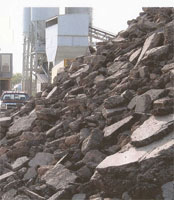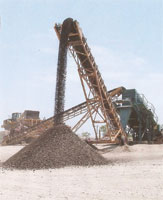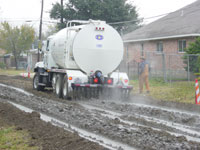City of Dallas uses FDR to Save Dollars and Create a Sustainable Environment
 Recognized as a cost-effective method to rehabilitate failed flexible pavements, full-depth reclamation (FDR) with portland cement provides an extremely durable material in a sustainable manner. Its benefits convinced the City of Dallas to embrace the use of FDR in the restoration of many badly deteriorated streets.
Recognized as a cost-effective method to rehabilitate failed flexible pavements, full-depth reclamation (FDR) with portland cement provides an extremely durable material in a sustainable manner. Its benefits convinced the City of Dallas to embrace the use of FDR in the restoration of many badly deteriorated streets.
In 2004, the City made a commitment to become a “greener” Dallas and developed a sustainability policy aimed at creating an environmentally friendly city. One of the many environmental issues it faced was waste management and in particular, the disposal of materials created from road repairs.
 The plan also looked at ways to reduce fuel emissions in the area. FDR with portland cement helped the City address both issues by reducing road construction debris that needed to be sent to a landfill, and the truck emissions needed to haul the waste to landfill.
The plan also looked at ways to reduce fuel emissions in the area. FDR with portland cement helped the City address both issues by reducing road construction debris that needed to be sent to a landfill, and the truck emissions needed to haul the waste to landfill.
The Asphalt Recycling and Reclaiming Association (ARRA) defines FDR as a: “…technique in which the full flexible pavement section and a predetermined portion of the underlying materials are uniformly crushed, pulverized, or blended, resulting in a stabilized base course… full depth reclamation is able to correct delinquent cross sections, increase the load-bearing strength of the base, and utilize 100 percent of the existing materials. Substantial savings can be realized while meeting environmental goals.” When using portland cement, an extremely durable base is created while maintaining the cost effectiveness of the FDR process.
 FDR’s benefits are clearly illustrated by The City of Dallas applications. Through the use of FDR, the city estimates it is recycling an average of 80% of its existing street materials and saving 40 percent per mile of roadway work. This is being achieved while reducing the landfilling of road repair debris – a major of goal of the City. With the cost savings, the City of Dallas is able to restore three times the amount of roadway with the same budget.
FDR’s benefits are clearly illustrated by The City of Dallas applications. Through the use of FDR, the city estimates it is recycling an average of 80% of its existing street materials and saving 40 percent per mile of roadway work. This is being achieved while reducing the landfilling of road repair debris – a major of goal of the City. With the cost savings, the City of Dallas is able to restore three times the amount of roadway with the same budget.
FDR restoration is also benefiting the Dallas commuters. “We were able to get our streets back to the driving public faster than we’ve done in the past,” said Gilbert Aguilar, assistant director of the Department of Streets and Sewers, Dallas. The FDR process reduced the time needed for road construction from 33 days per mile using traditional methods to 10 days per mile. This in turn reduced vehicle emissions resulting from delays and consequently engine idle time.
 The City of Dallas generally restores at least 50 centerline road miles with FDR with portland cement every year. Cement slurry is the application method of choice and depths of the slurry incorporation range from 6 to 12 inches depending on the site-specific material. Portland cement content by dry weight for the depths is generally 35 to 40 pounds per square yard. With this portland cement content, an unconfined compressive strength of 250 to 400 pounds per square inch (psi) is expected. The city has also been experimenting with application of the cement slurry via a spray bar that injects the slurry into the mixing chamber of the pulverization equipment.
The City of Dallas generally restores at least 50 centerline road miles with FDR with portland cement every year. Cement slurry is the application method of choice and depths of the slurry incorporation range from 6 to 12 inches depending on the site-specific material. Portland cement content by dry weight for the depths is generally 35 to 40 pounds per square yard. With this portland cement content, an unconfined compressive strength of 250 to 400 pounds per square inch (psi) is expected. The city has also been experimenting with application of the cement slurry via a spray bar that injects the slurry into the mixing chamber of the pulverization equipment.
FDR with cement makes an important contribution to Dallas’s sustainable development plan. With its durability and lower life-cycle costs, the area will reap its benefits for years to come.
Read more about how FDR provides a tremendous reduction in wasted material in Full-depth Reclamation: Recycling Roads Saves Money and Natural Resources SR495.